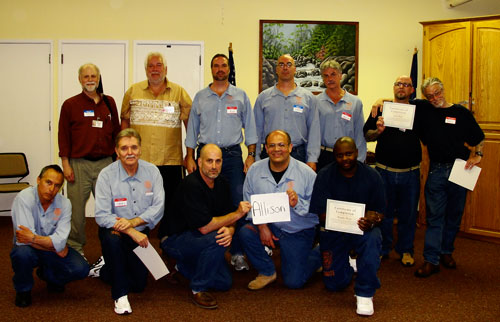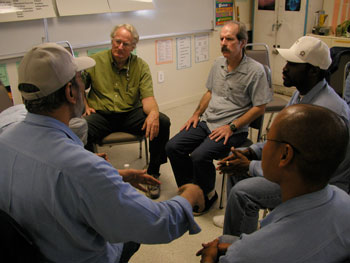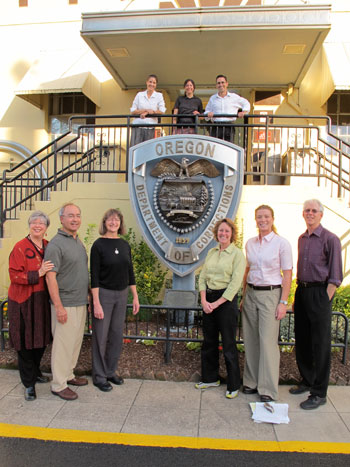
The first graduates from the Oregon Prison Project’s year-long program at Oregon State Penitentiary, July 2011.
Photo: So Kosal

Nonviolent Communication Teachings Bring Peace in Oregon Prisons
Is there a way to handle criminal justice that is more effective and humane than the current approach being used in the U.S, with its focus on long, mandatory prison sentences? Do prisons even meet our collective need for long-term public safety?
Fred Sly, director of the Oregon Prison Project, thinks there is a better way. Sly, who is completing a Ph.D in clinical psychology, started teaching Nonviolent Communication classes in San Quentin prison several years ago with the Bay Area NVC group. Four years ago, he moved to Oregon and helped found the Oregon Prison Project.
The Oregon Prison Project currently sends about 30 regular volunteers into four Oregon prisons, where they facilitate Nonviolent Communication classes with inmates. The training helps the inmates (and the facilitators) learn skills they can use to craft and maintain relationships that nurture themselves and those around them. It offers them a new way to understand life, and a perspective on how to achieve a peaceful and responsible relationship with themselves and with other people.
To understand the vision of the Oregon Prison Project, we have to imagine a world where everyone has a place at the table, where everyone belongs in the human community, and where everyone is able to share from the heart. This is a world where people can see mistakes as learning opportunities, and where everyone is allowed to be imperfectly human.
This vision is not the current reality for many inmates in the U.S. prison system. They often receive the message that they are not fully human, they do not really belong, and there is nothing they can ever do to heal the hurt that they have caused.

Fred Sly, director of the Oregon Prison Project, in green shirt, leading a Nonviolent Communication class at San Quentin State Prison.
Photo: Jesse Weins
Nonviolent Communication is a way to communicate with other people, but also a consciousness. It is the life work of Marshall Rosenberg, who was a student of humanistic psychologist Carl Rogers. Nonviolent Communication is often practiced at Buddhist meditation centers and monasteries, and many dharma practitioners have found it highly compatible with the teachings of the Buddha.
Victoria (Vika) Miller, executive director of the Oregon Prison Project, said, “I'm always delighted when I hear a prospective volunteer say they have a Buddhist practice, because I know they'll connect well with the consciousness of NVC.”
NVC is based on empathy, which according to Sly, is “a felt sense of what is alive in another person, coupled with a holistic understanding of what these feelings mean to the person, all without becoming that person.” Empathy is very similar to compassion, which is for many Buddhists the essence of the Buddha’s teachings. Whereas compassion could be thought of as the heart’s natural response to suffering, empathy could be thought of as the heart’s natural response to whatever is alive in another person, whether or not it involves suffering.
Sly sees empathy as something very natural, something that will emerge automatically, unless our cultural conditioning prevents us from being in touch with our natural empathy. He thinks we live in a “trauma culture,” where we are constantly being conditioned to disconnect from our natural empathy and see the world as full of “good guys” and “bad guys”. He points to the many police shows on television as examples of the way our culture encourages a victim/villain view of life, rather than an empathetic view of life that sees all human actions as attempts to meet universal human needs.
Advocates for longer prison sentences often say that prisons “hold offenders accountable for their actions.” Sly thinks there is a serious misunderstanding in our culture about what real accountability looks like. Real human beings make mistakes, and when they are accountable, they will acknowledge a mistake and try to make it right.
The issue is that people will not feel accountable if they are seen as less than human. They need acknowledgment of an unconditional humanity, or a basic level of belonging and acceptance, which can never be taken away. In short, they need to know that they and their needs also matter. In Sly’s words, “willingness to make restitution and amends arises spontaneously in a field of full empathic connection.”

Oregon Prison Project volunteers at Oregon State Penitentiary.
Photo: Fred Sly
Perhaps an example will help to illustrate how NVC can support inmates. There was an inmate in a class who had been severely abused as a child and was serving a life sentence for murdering his abuser. He was known in the group as being stone-faced and never showing emotions of any kind. He said during the class, “I shouldn’t be angry,” and expressed a belief that he was just as “bad” as the people who had harmed him.
One of the facilitators invited him to get more in touch with this anger and to honor it. The facilitator told him there is a kind of anger that comes from a deep place and is a life-honoring response that says, “I matter; I have value.” This kind of anger can lead us to be in touch with our life needs, and once we are clearer about these unmet needs, the anger may diffuse on its own.
After hearing this, the inmate transformed. When he came back the next week, he displayed all kinds of different emotions and his demeanor had completely changed. He was smiling, laughing and full of life. He had learned to honor and to relate more skillfully to his feelings, and learned how these feelings were signals connecting him to life and to his needs.
Research has shown that increasing empathic capacity in people will lead to more pro-social behavior and decrease aggression. Not only does NVC develop empathic capacity, it helps people learn to observe without getting lost in judgments, to gain more confidence and self-respect, and to make clear and specific requests from other people.
Perhaps the words of a former inmate will illustrate the transformative potential of NVC: “I’ve gotten good and positive skills to communicate more clearly and accurately with people without violence or anger. It also taught me to consider one’s needs and values.”
The Buddha said, “In a battle where there are winners and losers, both people lose.”
Justice does not have to be seen as a battle where the needs of victims or society are at odds with the needs of people who have been convicted of crimes. In NVC consciousness, our needs are universal and not in conflict; it is our strategies that we use to meet our needs that bring conflict. If we are not attached to specific strategies for meeting our needs, there is much less suffering and conflict. Here is an important connection with the Buddha’s teachings on non-attachment.
When people feel their needs also matter, and that they have a place at the table of humanity, they are much more likely to care about other’s needs. They are much more likely to learn how to live a more skillful and compassionate life.
The Oregon Prison Project is connected to:
Rose City NVC
4230 SE King Rd. #235, Milwaukie, OR 97222
503-395-5285
www.rosecitynvc.org
About the author:
Jeff Kerr attends the Portland Insight Meditation Center and is also the outreach coordinator for the Northwest Dharma Association. He is a volunteer with the Oregon Prison Project and leads a meditation group in a county jail.